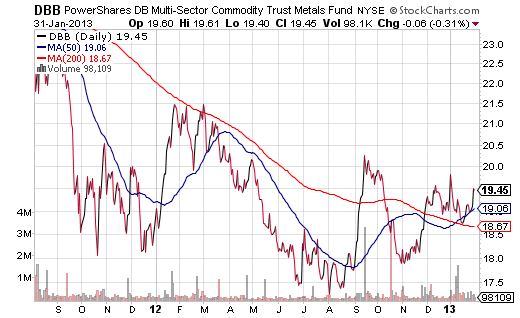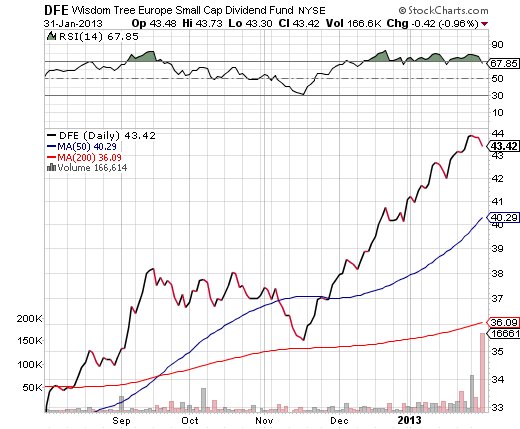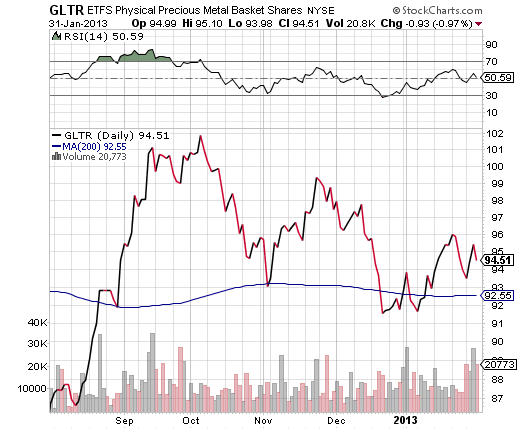Las Vegas odds-makers believe that the San Francisco 49ers will beat the Baltimore Ravens to win Superbowl XLVII this Sunday, February 3. That’s what is implied by a 4-point spread. In contrast, if the professionals did not feel that the 49ers had a definitive edge, there would neither be a spread nor a so-called “favorite.”
And yet, an equal percentage of gamblers are likely to bet on a Ravens victory. Some will choose the Ravens because they expect the 49ers to win by 3 points or less. Some will choose the Ravens because they expect the team to win outright. Others will choose a team based on little more than a hunch that one squad will prevail.
Why am I bringing up the big game? In part, it’s to illustrate that nobody has any idea who will hoist the Lombardi Trophy. Professional odds-makers, gamblers, grandpas, the guy down the street — there’s not a person who knows how the future will actually unfold. (Note: For what it’s worth, I like San Fran.)
Bringing the conversation back around to the world of finance, how many economists successfully “predicted” that U.S. gross domestic product (GDP) would contract in the final quarter of 2012? I haven’t seen a single credible “call.” Similarly, how many investment gurus expressed confidence that Greece would still be a member of the European Union by the end of 2012? Didn’t an overwhelming majority of folks insist that a “Grexit” was imminent?
Even when a superstar goes out on a limb with a bold prognostication, he/she did not actually know how the future would ultimately play out. Consider hedge fund sage John Paulson. The wunderkind was supposedly prescient for shorting sub-prime loans prior to the 2008 financial collapse. Yet he went on to lose -53% in 2011 and -18% in 2012 — hedge fund category returns that ranked “dead last” and second-to-last respectively.
Predictive powers do not exist. Still, the media frequently ask if I am bullish on this or bearish on that. Yes, I have definitive opinions - I was born and raised in New York, for heck’s sake. On the other hand, my finest quality as an asset manager is understanding how to minimize the loss when I am wrong.
For example, I have been a well-documented bull on Asia over the last 6 months. I used a wide variety of info to make the case for China’s turnaround, and so far, the markets are saying that I am right. Yet one of my favorite countries (Malaysia) in the region ran into political headwinds. Rather than insist that the China neighbor theme would work for every Asia-Pacific player, I exited Malaysian equities; also, I increased my exposure to iShares MSCI Asia excl Japan (AAXJ) as well as iShares MSCI Australia (EWA). In some aggressive accounts, I initiated a position in PowerShares DB Base Metals (DBB), sensing that metals like copper and zinc would play a large role in China’s economic resurgence.

Does my conviction on Asia’s recovery make me an unqualified stock ETF bull? Hardly. I gave the example of how I reduced exposure to the Malay peninsula. What’s more, I employ stop-limit losses, non-correlated assets and hedges to reduce portfolio risk.
At the same time, there are plenty of reasons for optimists to rethink the recent exuberance. Corporate earnings are growing at a slower rate than previous quarters. Consumer sentiment is falling. Meanwhile, 4th quarter GDP was downright abysmal. (Note: The cynic in me recognizes that bad economic data may only benefit stocks in the near-term, as the Fed has that ammunition to keep purchasing bonds by the boat-load.)
If you want to press the bear button, you might do so on unhedged European equities. For instance, a fund like WisdomTree Small Cap Europe Dividend (DFE) is severely overbought on a technical basis via months of extremely high Relative Strength Index (RSI) readings. The euro currency itself is due for a pullback. And Europe’s economic malaise has been getting worse, not better… making it harder for smaller companies to thrive. Ultra-aggressive ETF enthusiasts might consider shorting WisdomTree Small Cap Europe Dividend (DFE).

There are several other ETFs that bearish investors might want to take a look at. For instance, precious metals have been noticeably resilient over the last 6 months. They may not have picked up the kind of ground that capital appreciators hope for. On the other hand, with nearly every country on the planet looking for ways to devalue its currency, precious metals serve as an ideal proxy vote. Both ETFS Phyiscal Precious Metals (GLTR) as well as ETFS Silver Trust (SIVR) are above 200-day long-term trendlines.

Disclosure: Gary Gordon, MS, CFP is the president of Pacific Park Financial, Inc., a Registered Investment Adviser with the SEC. Gary Gordon, Pacific Park Financial, Inc, and/or its clients may hold positions in the ETFs, mutual funds, and/or any investment asset mentioned above. The commentary does not constitute individualized investment advice. The opinions offered herein are not personalized recommendations to buy, sell or hold securities. At times, issuers of exchange-traded products compensate Pacific Park Financial, Inc. or its subsidiaries for advertising at the ETF Expert web site. ETF Expert content is created independently of any advertising relationships.
And yet, an equal percentage of gamblers are likely to bet on a Ravens victory. Some will choose the Ravens because they expect the 49ers to win by 3 points or less. Some will choose the Ravens because they expect the team to win outright. Others will choose a team based on little more than a hunch that one squad will prevail.
Why am I bringing up the big game? In part, it’s to illustrate that nobody has any idea who will hoist the Lombardi Trophy. Professional odds-makers, gamblers, grandpas, the guy down the street — there’s not a person who knows how the future will actually unfold. (Note: For what it’s worth, I like San Fran.)
Bringing the conversation back around to the world of finance, how many economists successfully “predicted” that U.S. gross domestic product (GDP) would contract in the final quarter of 2012? I haven’t seen a single credible “call.” Similarly, how many investment gurus expressed confidence that Greece would still be a member of the European Union by the end of 2012? Didn’t an overwhelming majority of folks insist that a “Grexit” was imminent?
Even when a superstar goes out on a limb with a bold prognostication, he/she did not actually know how the future would ultimately play out. Consider hedge fund sage John Paulson. The wunderkind was supposedly prescient for shorting sub-prime loans prior to the 2008 financial collapse. Yet he went on to lose -53% in 2011 and -18% in 2012 — hedge fund category returns that ranked “dead last” and second-to-last respectively.
Predictive powers do not exist. Still, the media frequently ask if I am bullish on this or bearish on that. Yes, I have definitive opinions - I was born and raised in New York, for heck’s sake. On the other hand, my finest quality as an asset manager is understanding how to minimize the loss when I am wrong.
For example, I have been a well-documented bull on Asia over the last 6 months. I used a wide variety of info to make the case for China’s turnaround, and so far, the markets are saying that I am right. Yet one of my favorite countries (Malaysia) in the region ran into political headwinds. Rather than insist that the China neighbor theme would work for every Asia-Pacific player, I exited Malaysian equities; also, I increased my exposure to iShares MSCI Asia excl Japan (AAXJ) as well as iShares MSCI Australia (EWA). In some aggressive accounts, I initiated a position in PowerShares DB Base Metals (DBB), sensing that metals like copper and zinc would play a large role in China’s economic resurgence.

Does my conviction on Asia’s recovery make me an unqualified stock ETF bull? Hardly. I gave the example of how I reduced exposure to the Malay peninsula. What’s more, I employ stop-limit losses, non-correlated assets and hedges to reduce portfolio risk.
At the same time, there are plenty of reasons for optimists to rethink the recent exuberance. Corporate earnings are growing at a slower rate than previous quarters. Consumer sentiment is falling. Meanwhile, 4th quarter GDP was downright abysmal. (Note: The cynic in me recognizes that bad economic data may only benefit stocks in the near-term, as the Fed has that ammunition to keep purchasing bonds by the boat-load.)
If you want to press the bear button, you might do so on unhedged European equities. For instance, a fund like WisdomTree Small Cap Europe Dividend (DFE) is severely overbought on a technical basis via months of extremely high Relative Strength Index (RSI) readings. The euro currency itself is due for a pullback. And Europe’s economic malaise has been getting worse, not better… making it harder for smaller companies to thrive. Ultra-aggressive ETF enthusiasts might consider shorting WisdomTree Small Cap Europe Dividend (DFE).

There are several other ETFs that bearish investors might want to take a look at. For instance, precious metals have been noticeably resilient over the last 6 months. They may not have picked up the kind of ground that capital appreciators hope for. On the other hand, with nearly every country on the planet looking for ways to devalue its currency, precious metals serve as an ideal proxy vote. Both ETFS Phyiscal Precious Metals (GLTR) as well as ETFS Silver Trust (SIVR) are above 200-day long-term trendlines.

Disclosure: Gary Gordon, MS, CFP is the president of Pacific Park Financial, Inc., a Registered Investment Adviser with the SEC. Gary Gordon, Pacific Park Financial, Inc, and/or its clients may hold positions in the ETFs, mutual funds, and/or any investment asset mentioned above. The commentary does not constitute individualized investment advice. The opinions offered herein are not personalized recommendations to buy, sell or hold securities. At times, issuers of exchange-traded products compensate Pacific Park Financial, Inc. or its subsidiaries for advertising at the ETF Expert web site. ETF Expert content is created independently of any advertising relationships.
